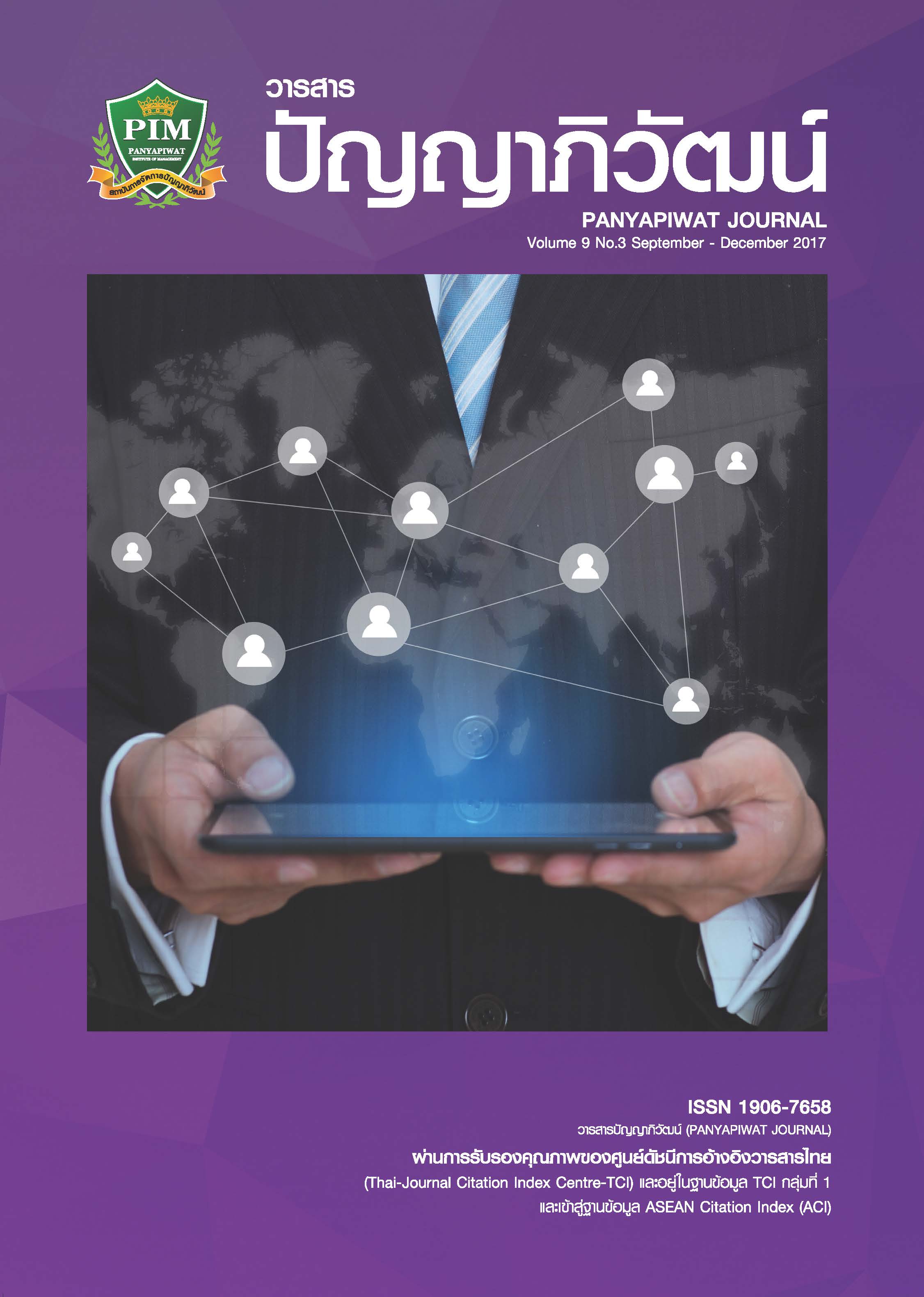อิทธิพลของคุณลักษณะการกำกับดูแลกิจการที่ดีต่อความไว้วางใจของลูกค้ารัฐวิสาหกิจในประเทศไทย
Main Article Content
บทคัดย่อ
การวิจัยเรื่องนี้มีวัตถุประสงค์เพื่อศึกษาอิทธิพลของคุณลักษณะการกำกับดูแลกิจการที่ดีของรัฐวิสาหกิจที่มีต่อความไว้วางใจของลูกค้ารัฐวิสาหกิจในประเทศไทย เป็นการวิจัยเชิงสำรวจ ผู้วิจัยใช้การเก็บข้อมูลด้วยแบบสอบถามโดยสุ่มตัวอย่างแบบหลายขั้นตอน (Multi - Stage Sampling) จากลูกค้ารัฐวิสาหกิจในประเทศไทยทั่วประเทศ จำนวน 836 ราย วิเคราะห์ข้อมูลด้วยการวิเคราะห์สมการเชิงโครงสร้าง (Structural Equation Modeling: SEM) ผลการวิจัยพบว่า คุณลักษณะการกำกับดูแลกิจการที่ดีของรัฐวิสาหกิจมีอิทธิพลทางบวกต่อความไว้วางใจของลูกค้ารัฐวิสาหกิจในระดับสูง มีค่าอิทธิพลทางตรง 0.91 ผลการประเมินความกลมกลืนของแบบจำลองพบว่า มีความสอดคล้องกับข้อมูลเชิงประจักษ์ โดยมีค่าไคสแควร์ 16.60 ณ ระดับค่าองศาเสรีเท่ากับ 20 ค่าไคสแควร์สัมพัทธ์เท่ากับ 0.83 และค่าความน่าจะเป็น (P-Value) เท่ากับ 0.68 ค่าดัชนีวัดระดับความสอดคล้องเชิงสัมบูรณ์ (GFI) เท่ากับ 0.996 ค่ารากกำลังสองของค่าเฉลี่ยของความคลาดเคลื่อนโดยประมาณ (RMSEA) เท่ากับ 0.00 ตัวแปรในตัวแบบสามารถอธิบายความแปรปรวนของความไว้วางใจของลูกค้ารัฐวิสาหกิจในประเทศไทยได้ร้อยละ 83.0 คุณลักษณะการกำกับดูแลกิจการที่ดีของรัฐวิสาหกิจ และความไว้วางใจที่มีค่าน้ำหนักมากที่สุดคือ จรรยาบรรณ และความไว้วางใจด้านศักยภาพ
The objective of this research is to investigate the influence of corporate governance characteristics on State Owned Enterprises (SOEs) customer trust in Thailand. Survey research was employed by using questionnaire as a research instrument. Multi-stage sampling was used. Data were collected from 836 SOEs customers in Thailand. Structural equation modeling was used to analyze the data. The results revealed that corporate governance characteristics had a high positive influence on SOEs customer trust in Thailand, direct effect is 0.91. Assessment on goodness of fit from the model found it was consistent with the empirical data, the chi-square = 16.60, the degrees of freedom = 20, chi-square relative = 0.83, the probability (P-value) = 0.68, goodness of fit index (GFI) = 0.996, Root mean square error of approximation (RMSEA) = 0.00.Variables in the model can explain the variance of SOEs customer trust in Thailand was 83%. The highest factor weight of corporate governance characteristics variable was ethics. The highest factor weight of customer trust variable was competency trust.
Article Details
“ข้าพเจ้าและผู้เขียนร่วม (ถ้ามี) ขอรับรองว่า บทความที่เสนอมานี้ยังไม่เคยได้รับการตีพิมพ์และไม่ได้อยู่ระหว่างกระบวนการพิจารณาลงตีพิมพ์ในวารสารหรือแหล่งเผยแพร่อื่นใด ข้าพเจ้าและผู้เขียนร่วมยอมรับหลักเกณฑ์การพิจารณาต้นฉบับ ทั้งยินยอมให้กองบรรณาธิการมีสิทธิ์พิจารณาและตรวจแก้ต้นฉบับได้ตามที่เห็นสมควร พร้อมนี้ขอมอบลิขสิทธิ์บทความที่ได้รับการตีพิมพ์ให้แก่สถาบันการจัดการปัญญาภิวัฒน์หากมีการฟ้องร้องเรื่องการละเมิดลิขสิทธิ์เกี่ยวกับภาพ กราฟ ข้อความส่วนใดส่วนหนึ่งและ/หรือข้อคิดเห็นที่ปรากฏในบทความข้าพเจ้าและผู้เขียนร่วมยินยอมรับผิดชอบแต่เพียงฝ่ายเดียว”
เอกสารอ้างอิง
Boonphakrob, P. (2008). The Development of a Tool to Measure Key Factors Affecting the Trust of Citizens on Government Officials. Bangkok: OCSC. [in Thai]
Bourdeau, L. B. (2005). A new examination of service loyalty: Identification of the antecedents and outcomes of additional loyalty framework. Doctoral Thesis, Florida University, Gainesville, Florida.
Butler, J. K. (1991). Toward understanding and measuring conditions of trust: Evolution of a conditions of trust inventory. Journal of Management, 17, 643-663.
Caldwell, C. & Clapham, S. E. (2003). Organizational trustworthiness: An international perspective. Journal of Business Ethics, 47(4), 349-364.
Covey, S. M. R. & Merrill, R. R. (2008). The speed of trust. New York: The Free Press.
Davis, J. H., Lee, M. & Ruhe, J. (2008). Trust: an intercultural comparison of consumer perceptions. International Journal of Commerce and Management, 18(2), 150-165.
Hair, J. F., Black, W. C., Babin, B. J. & Anderson, R. E. (2010). Multivariate data analysis (7th ed.). Upper Saddle River, NJ: Prentice Hall.
Hunt, M. L., Lara, T. M. & Hughey, A. W. (2009). Establishing and Maintaining Organizational Trust in the 21st Century. Industry & Higher Education, 23(2), 71-77.
Janjaochai, D. (2012). White Ocean Strategy (15th ed.). Bangkok: DMG. [in Thai]
Khomchu, C. (2002). Good governance, transparent governance with ethics (2nd ed.). Bangkok: Numfon. [in Thai]
Khomlaow, S. & Pasunon, P. (2015). Business Trust and Effective Factor of Business Trust between the Import and Export Customers with Logistics provider at Suvannabhum Airport. Philosophy thesis doctoral in Management, Silpakorn University. [in Thai]
Khongsompong, K. (2011). Build Trust & Reliability Strategies that tie the customer forever.Marketeer,12(132), 144-145. [in Thai]
Pitaktapsombud, P. (2005). Sampling Survey: Theory and Practice (3rd ed.). Bangkok: Sematum. [in Thai]
Reina, D. S. & Reina, M. L. (1999). Trust & Betrayal in the Workplace. San Francisco: Berrett-Koehler.
Robbins, S. P. (2005). Essentials of Organizational Behavior (8th ed.). New Jersey: Pearson Prentice Hall.
Roy, S. K., Devlin, J. F. & Sekhon, H. (2015). The Impact of Fairness on Trustworthiness and Trust in Banking. Journal of Marketing Management, 31(9-10).
Sakolkittinapakul, R. & Taweesuk, P. (2017). Analysting Factors of Content Marketing that Influencing Trust of Apparel Customers in Electronic Commerce. Panyapiwat Journal, 9(1), 8-10. [in Thai]
Siljaru, T. (2014). Research and analysis of statistical data by SPSS and AMOS (15th ed.). Bangkok: SR Printing Mass Product. [in Thai]
Sriphet, N. (2015). Customer’s Trust Creation Approach on Insurance Businesses in Thailand. Academic Journal Bangkokthonburi University, 3(2), 86-96. [in Thai]
State Enterprise Policy office, Bureau of Policy and Planning. (2009). Principles and guidelines for good governance in state enterprises 2009. Bangkok: SEPO. [in Thai]
State Enterprise Policy office, Bureau of Policy and Planning. (2009). Important information of Thai state enterprises Vol.1 (1/2009). Bangkok: SEPO. [in Thai]
Thailand Development Research Institute. (2014). Corruption and Exploitation. Bangkok: Aksonsumphan 1987. [in Thai]
Ullman, J. B. & Bentler, P. M. (2004). In M. Hardy & A. Bryman (Eds.). Handbook of data analysis.London: SAGE Publications.
Vanichbuncha, K. (2013). Structural equation modeling analysis (SEM) AMOS. Bangkok: Samlada. [in Thai]
Vasri, P. (1999). Sufficiency Economy and Civil Society to Revive the Economy (6th ed.). Bangkok: Mor Chao Ban. [in Thai]


